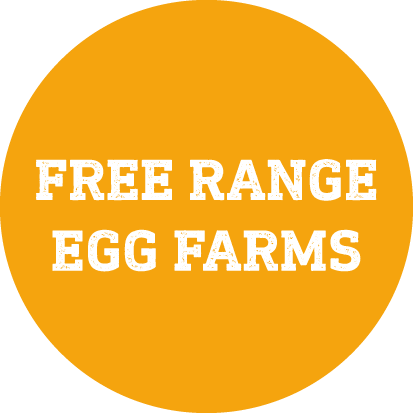Nutrition
The following information offers a general background on the benefits of several important vitamins and minerals found in eggs. Except where noted, this information has been compiled by a leading independent nutritionist, Jane Barnes.
Vitamin D
There is increasing recognition that a significant number of Australians may receive less than optimal levels. The major function of Vitamin D is to help your body absorb calcium from your diet. Their are only 2 sources of Vitamin D, sunlight and a small range of foods. Deficiency of Vitamin D results in inadequate mineralisation or demineralisation of the skeleton. This can lead to rickets in young children, causing bowed legs and knocked knees. In adults, deficiency can lead to osteoporosis and may adversely affect bone fracture rates. Eggs are one of the few foods that contain vitamin D, the sunshine vitamin.
Recommendation: Infants, children and adults require up to 5.0 µg per day, while adults 51-70 require up to 10.0 µg per day and if you are over 70 you need up to 15.0 µg per day.
Source: NHMRC
Iodine
Over 40% of Australians have insufficient iodine in their diet. You must have a regular source and insufficient levels can slow mental development in the unborn and new born infants. Cretinism is an extreme mental condition affecting 80 million worldwide. Goitre (enlarged thyroid gland) is seen in moderate but prolonged iodine insufficiency affecting behaviour.
Source: Professor David Farrell
Recommendation: Adults require 150 µg per day and women require 220 µg during pregnancy or 270 µg while breast feeding.
Source: NHMRC
Omega 3 fats
This small group of fats are vital from life’s start to finish. Firstly for early development of brain, optical vision and nervous system. Secondly these fats are the core of many membranes in the body. Thirdly they appear to have central regulatory action in maintaining regular heart and arterial function. In later life many of the degenerative diseases (stroke and arthritis) are linked to inflammatory type actions, this appears to be moderated by a favourable omega 3 to omega 6 ratio also reducing the risk of blood clotting, the common cause of stroke. Omega 3 is only found in significant quantities in a limited range of foods.
Recommendation: Extra is necessary through pregnancy and breast feeding, early developmental years and throughout adult hood to protect your vascular and inflammatory system.
Selenium
Selenium is central to the full working of the ‘antioxidant protective system’ which combats the destructive action of the oxygen generated free radicals, now known to be the triggers for diseases such as cancer, heart disease and other degenerative changes. As selenium levels in foods vary greatly because levels vary in the feed or soil, average intakes have been found to be lower than previously estimated.
Recommendation: A stable supply is vital throughout your life.
Vitamin E
This is a powerful antioxidant vital to avoid destruction of membranes and blood components from ‘free radical’ damage. It is estimated that over 1/2 million vitamin E protective reactions occur each day in the body. Vitamin E is vital for internal functioning but has also been shown to help cell recovery even when used externally (vitamin E containing creams). Vitamin E is what is known as fat soluble, so is found in foods containing fat. As many people have reduced their intake of these foods, other concentrated Vitamin E foods are useful to ensure adequate protective intakes are eaten.
Recommendation: Vital at all ages and all times.
B12
This vitamin, although a key element in the daily metabolism of both fats and carbohydrates, is in greater demand in early and late life. In early life it is necessary for the proper formation of nerve cells and protection of the genetic material known as DNA. As absorption appears to decrease in later life greater amounts are required to fulfil the same functions. Only found in animal foods and normally in very small amounts so vegetarians have no major source. There is no evidence of over-dosage so this is one situation where more seems always to be better.
Recommendation: Useful for vegetarians who have a lower intake. And extra is necessary during pregnancy, whilst breast feeding, by young children and older adults.
Folate
Red blood cells cannot form properly without this vitamin, nor can genetic material be transferred correctly during normal growth and repair. So folate is always vital. It is especially necessary throughout pregnancy (can prevent neural tube malformation, spina bifida) but is also now found to be central in reducing the levels of a substance called homocysteine in the blood, which is found to be as strong a trigger for heart attack as high levels of cholesterol.
Recommendation: Always vital as life starts requiring folate to ensure successful pregnancy, necessary for daily formation of healthy blood cells and certain digestive enzymes and life continues with need for extra folate to minimise risk of heart attack.
